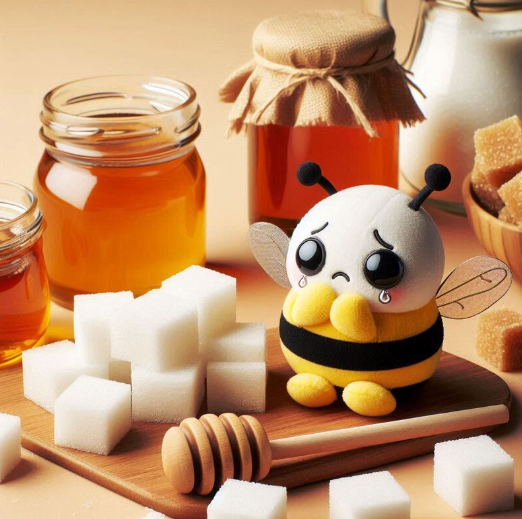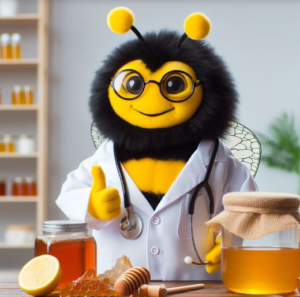For many years, honey has been celebrated not only for its delightful sweetness but also for its potential health benefits. However, beneath the glossy labels and charming jars lies a hidden truth: is honey really as beneficial as we have been led to believe? This question warrants a closer examination, especially considering the various types of honey available in the market today.
This morning, as I relaxed in my garden soaking up the early sunlight, I shared a conversation with a friend about the busy bees flitting from flower to flower. During our chat, I learned that a single bumblebee dedicates its entire life to produce only a minuscule amount of honey, roughly the size of a thimble. This astonishing fact made me ponder the sheer volume of honey found on supermarket shelves and how that could be possible.
My friend pointed out an alarming reality: much of what we assume to be pure honey may not be authentic at all. This revelation made me curious about the discrepancy between the vast quantities available and the limited output from individual bees. It became clear that we must dig deeper into the industry practices surrounding honey production to truly understand what we consume.
As we delved into the topic, it became apparent that the innocent jar of honey sitting on my kitchen shelf held a secret that many consumers are unaware of. It is disheartening to discover that the sweet nectar we cherish may not be the pure honey we imagine. In fact, some jars may contain blends or additives that compromise the very essence of honey. This realization is a wake-up call for all of us who value the health benefits associated with consuming honey.

Table of Contents
ToggleUncovering the Truth Behind Supermarket Honey
It may surprise you to learn that a significant portion of the honey available in supermarkets originates from countries like China, where production costs are substantially lower than those of local beekeepers. This raises important questions about the authenticity of these imports. Reports indicate that some of this honey has been adulterated with sugar syrup, which can mislead consumers into believing they are buying genuine honey.
Many people consume what they believe to be “100% pure honey,” thinking they are making a healthy choice. However, it is likely that they are unknowingly consuming a product that is merely a blend of inexpensive substitutes. This is a harsh reality, particularly for those who view honey as a natural alternative to refined sugar. We will delve deeper into the implications of this misconception later in our discussion.
What’s even more concerning is the lack of transparency surrounding honey labeling. Supermarkets often boast about their honey being traceable back to the beekeeper, yet they conveniently omit crucial details about the honey's country of origin. This lack of information makes it challenging for consumers to make informed choices about the products they purchase. How can we navigate this deceptive landscape when essential details are intentionally obscured?
The Impact of Fraudulent Honey on Beekeepers and Consumer Health
The ramifications of misleading consumers extend far beyond mere deception at the point of sale. Beekeepers around the world are facing significant financial hardship as the market becomes flooded with counterfeit honey. This not only undermines the hard work and passion of dedicated beekeepers but also threatens the very existence of local bee populations. Furthermore, the health implications of consuming adulterated honey should not be overlooked.
These alarming revelations serve as a critical reminder for consumers. We must peel back the layers of misinformation and demand greater transparency in the food supply chain. It is essential that we scrutinize product labels, ask questions, and actively support local producers who prioritize the integrity of their products. Moving forward, I am committed to purchasing only local, organic honey, preferably sourced directly from beekeepers or local farmers markets.
As a vigilant consumer, I invite you to join me in this quest for authenticity. By sharing this article, we can raise awareness about the hidden truths of honey production and empower others to make informed choices.
Let’s ensure that the next time we reach for that jar of honey, we do so with a clear understanding of what we are consuming. Our health is far too valuable to be jeopardized by misleading practices in the food industry.

Discover the Health Benefits of Authentic Organic Honey
If you’re like me and value authentic honey, it’s essential to understand its benefits. Honey is not just a delightful sweetener; it is also a powerhouse of health benefits that have been revered by traditional medicine for centuries. The unique properties of genuine honey offer several compelling reasons to include it in your daily diet.
The Incredible Nutritional Profile of Honey
Beyond its delectable taste, honey boasts a remarkable nutritional profile rich in various beneficial compounds. Studies have demonstrated that honey possesses a wide range of properties, including antibacterial, antioxidant, anticancer, anti-inflammatory, and antiviral effects. These attributes not only enhance its flavor but also contribute significantly to overall health and wellness.
Harnessing the Antibacterial Properties of Honey
One of the most celebrated health benefits of honey is its antibacterial capability. When applied topically, honey can inhibit the growth of bacteria, making it an excellent natural remedy for preventing infections and promoting wound healing. Its antibacterial properties can be harnessed both externally, by using it as a topical ointment, and internally, through consumption, enhancing overall health and wellness.
The antibacterial effects of honey are attributed to enzymes like glucose oxidase, which produce hydrogen peroxide when honey is applied to wounds. High hydrogen peroxide levels in honey are linked to its effectiveness in healing wounds and serving as a natural antibacterial agent, making it a valuable addition to any health-conscious diet.
Exploring Honey's Antioxidant Benefits
Honey is a treasure trove of antioxidants, with primary compounds such as flavonoids—including quercetin—and phenolic acids. These antioxidants play a crucial role in neutralizing harmful free radicals and protecting cells from oxidative stress, which is linked to numerous chronic diseases. While the body produces its own antioxidants, supplementing with honey can bolster your diet and enhance your body's ability to maintain cellular health.
In addition to these antioxidants, honey contains short peptides produced by enzymes known as proteases. These peptides, which consist of essential amino acids like cysteine, methionine, and tyrosine, contribute to honey's antioxidant capacity. It's worth noting that these enzymes also aid in protein digestion, breaking down proteins into peptides and amino acids for the body to use in repair and growth.
Understanding Honey's Anti-inflammatory Properties
<div class="element
